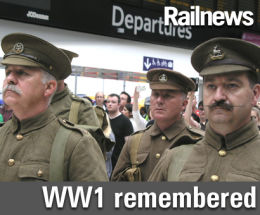Posted 11th August 2014 | 1 Comment
Soldiers commemorated at Waterloo

A GROUP of men wearing army uniforms of one hundred years ago has marched across the concourse at London Waterloo to commemorate the major mobilisation of men and equipment which started as war was declared in August 1914.
The parade at Waterloo was followed by a journey to Southampton, which was the chief point of embarkation for the front in France. By the end of August, Southampton had handled more than 600 military special trains carrying more than 100,000 soldiers and 37,000 horses in total, who were then taken across the Channel in requisitioned ferries.
The embarkations were the start of a bitter four years of conflict.
The men on parade at Waterloo were members of the Khaki Chums, accompanied by Scottish pipers, and their parade has marked the start of a series of commemorations staged by Network Rail and the Rail Delivery Group, which also includes an exhibition assisted by the photographic archives of the National Railway Museum.
This exhibition will remain at Waterloo until 9 September before touring five of the largest stations elsewhere in the country over the next year. It will then be redesigned each summer with a new theme relating to the railway's war effort from 100 years before.
Robin Gisby, managing director of operations for Network Rail, said: "When Britain declared war against Germany in 1914, it was the railway that enabled the rapid mobilisation of British forces and their equipment to France. From that point on, rail played a crucial role in the war effort, not just through transportation; stations were places to advertise vital information and feed and welcome home troops on leave or those brought back injured.
"As Britain commemorates the centenary of the start of the war, there are so many stories but we wanted to make sure that those railway workers who fought abroad and worked at home were remembered and their story told to a new generation of rail staff and passengers alike."
Michael Roberts is director general of the Rail Delivery Group, representing passenger and freight operators as well as Network Rail. He added: "As the country looks back 100 years to commemorate the start of World War One, the rail industry is marking the important contribution made by the railway, and its workers during the conflict. The pictures and words in the exhibition touring some of our biggest stations tell the story of rail’s crucial role in quickly mobilising our armed forces, and how women kept the railway running when men left for war and labour shortages threatened the transport of vital supplies to the Front Line.”
Reader Comments:
Views expressed in submitted comments are that of the author, and not necessarily shared by Railnews.

Roshan, Leeds
The railways were vital for Britain in World War One. Let's hope more people realise their value.